An obituary of Moorhead Kennedy Jr., one of the U.S. hostages in Iran, helps to spotlight what is absent in the Biden regime’s secretary of state and national security adviser.
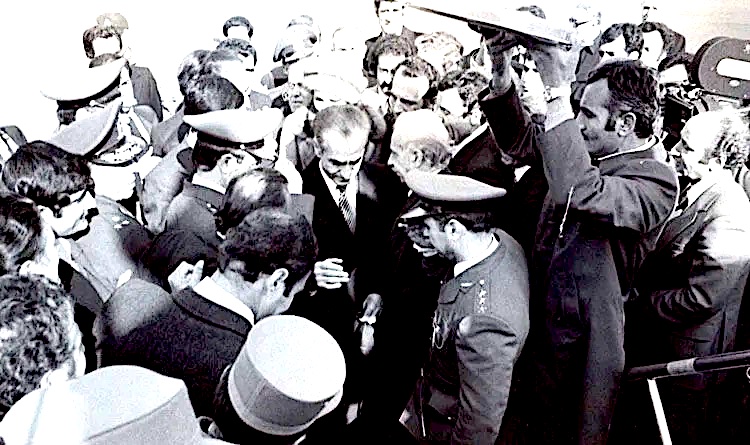
The shah leaving Iran, Mehrabad International Airport – Jan. 16, 1979. (Wikimedia Commons, Public domain)
By Patrick Lawrence
ScheerPost
 Here is a modest proposal, nothing too radical, just good sense. Turn over Antony Blinken and Jake Sullivan to the Iranian authorities on the understanding the two statesmen, very loosely defined, would spend 444 days at the U.S. embassy compound in Tehran. Let’s think of it as a reenactment.
Here is a modest proposal, nothing too radical, just good sense. Turn over Antony Blinken and Jake Sullivan to the Iranian authorities on the understanding the two statesmen, very loosely defined, would spend 444 days at the U.S. embassy compound in Tehran. Let’s think of it as a reenactment.
Said premises, long a mess of barbed wire, weeds, brambles, mold and anti–American graffiti, is now a museum. The Den of Espionage, as it is called, is dedicated to the shameful history of U.S.–Iranian relations leading up to that fateful day, Jan. 16, 1979, when the shah was deposed by a nation that had had enough of him.
Those unkind Iranians had to rub it in: The old graffiti is now covered over with mocking murals featuring Mickey Mouse and McDonald’s.
All the better, I say. My theory is that the Biden regime’s secretary of state and national security adviser would return from their year and 79 days in the embassy — sitting on the floor, sleeping in the offices, washing their socks in bathroom sinks, the whole nine — transformed almost beatifically into… into statesmen of high purpose and deep insight, the two being devoid of both as we have them now.
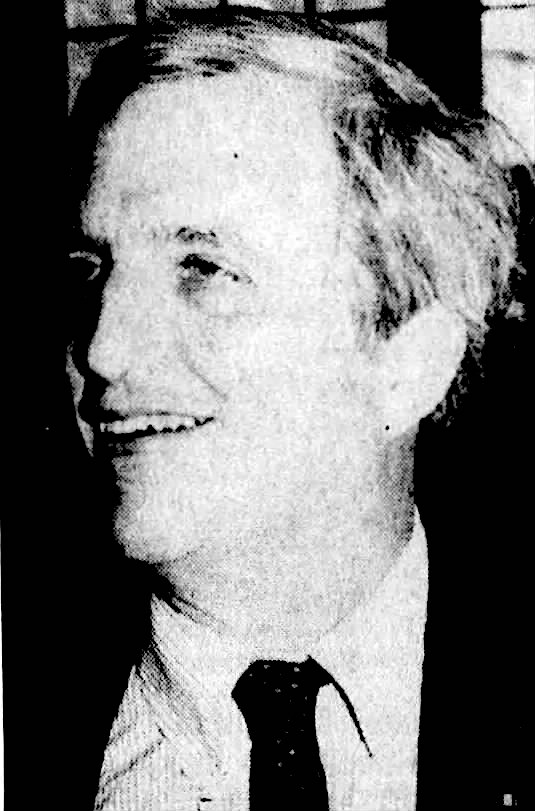
Moorhead C. Kennedy Jr. in 1985. (Wikimedia Commons, Public domain)
I am inspired to these thoughts by a good obituary The New York Times ran in its May 18 editions on the death of a good man named Moorhead Kennedy Jr.
Moorhead Kennedy’s blood ran very blue: Upper East Side childhood, Groton, Princeton, Harvard Law, a career in the Foreign Service. Having learned Arabic, he was something of a Middle East man, his assignments over the years including Yemen and Lebanon.
And then destiny placed its gentle hand on Kennedy’s shoulder: He was on a temporary assignment as economics attaché in Tehran when the fecal matter hit the fan.
And so Kennedy was among those 52 Americans — diplomats, others in civil service jobs — who spent the famous 444 days captives of militant but nonviolent, I would say altogether righteous students who had broken down the embassy gates and climbed over its walls.
They were of many stripes, secular and religious, but they were all repelled by the shah’s coercive insistence on Westernizing Iran in the worst kind of way — “Westoxicity,” as it came to be called.
Many of them spent their days poring through the embassy files and diplomatic cables to reconstruct just how, covertly and criminally, the U.S. had been attempting to overthrow the Iranian government for the second time in 26 years.
I recall years later seeing black-and-white news footage of the hostages as they filed up the stairs to board an Air Algeria flight home on Jan. 20, 1981. One of the diplomats turned back a few steps short of the cabin door, shouted something the film did not record, and gave the Islamic Republic and all its citizens a great big middle finger.
Ah, yes, I recall thinking, with what dignity are we represented to the world.
Moorhead Kennedy would have had as much reason to vent his anger as that vulgarian on the stairs. He was blindfolded and tied to a chair when students filed into his office.
But something happened to Kennedy during the long months that followed. He began talking to those who had stormed the embassy. And most of all, he began listening to them.
I have long argued that the first signs that an imperium is in decline are when it goes blind and deaf; it can neither see others for who and what they are nor hear what they have to say. Kennedy proved to suffer from neither of these symptoms.”
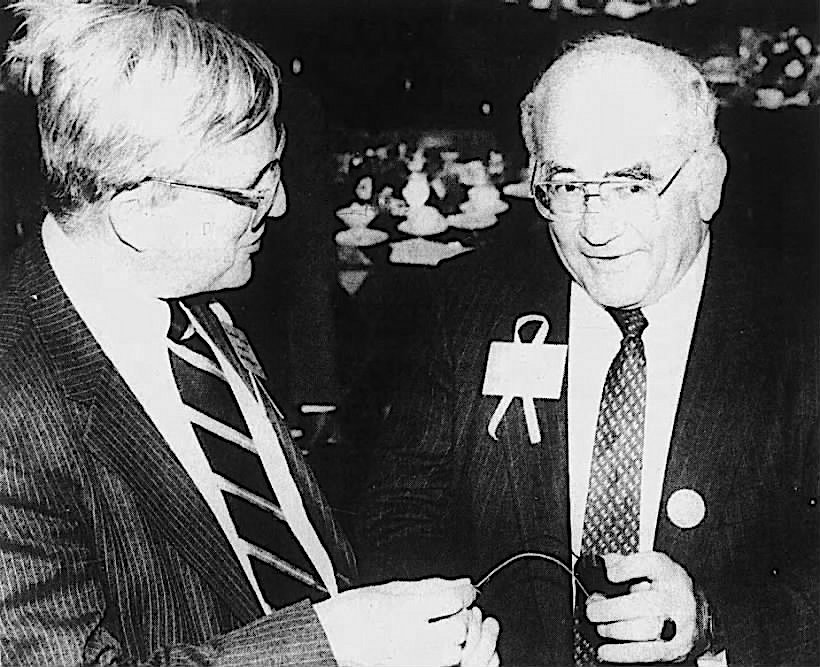
Kennedy left, with Ed Asner in 1986. (Wikimedia Commons, Public domain)
As he later recounted his experience in an interview with a small public-affairs journal in Connecticut, Kennedy seemed to have brought a singularly open mind to what was supposed to be a brief assignment filling in for an absent colleague. “I was very interested in seeing a revolution in progress,” he told a reporter from CT Mirror in 2016.
“It was a very fruitful time until, all of a sudden, I heard a shout from the Marines, ‘They’re coming over the wall!’ And then a whole new experience began.”
There is a wonderful photograph of Kennedy atop the Times’ obit, taken in the embassy during his captivity. It shows him sitting at his desk, calmly reading with his fingers to his chin. On the floor beside him are two colleagues whose beards make them look like they are among Kennedy’s captors.
On his desk you see the paraphernalia of makeshift meals: a jar of mustard, a jar of Sanka repurposed as a sugar bowl, a box of Cocoa Krispies. I suspect Kennedy’s apparent composure had something to do with that unshakable aplomb you often find in American bluebloods.
It is odd now to think you are looking at a man midway through a life-altering metamorphosis from which he had the integrity never to turn back.
It was in the embassy that Kennedy began to reflect on what he was doing as an American foreign service officer and to conclude that what he was doing was emphatically not what he ought to have been doing because the nation he served had it all wrong.
“Mr. Kennedy’s thoughts on U.S. foreign policy,” as the Times’ obit explains, “were partly shaped by discussions with his captors.”
Please Donate to the
Spring Fund Drive!
“Those Americans who applauded the Westernizing efforts of the shah had little notion of how his programs had disrupted lives at all levels of society,” Kennedy wrote, when he looked back later, in The Ayatollah in the Cathedral: Reflections of a Hostage (Hill & Wang, 1986).
“Many Iranians, disoriented, forced to think in new and strange ways, to perform unfamiliar tasks in accordance with unfamiliar norms, humiliated by their inadequacies as they tried to behave as Westerners, and disinclined to become proximate Westerners, second-class at best, sought above all for a renewed sense of their own identity.”
There is something brilliant, in a certain way almost miraculous, in the deep, personal transformation implicit in those observations. Kennedy was telling us he learned while in the embassy a lesson I have long considered the most fundamental that our time requires of us but one too few of us even attempt: This is the capacity to see from the perspectives of others by way of seeing them with clear eyes and hearing them with open ears.
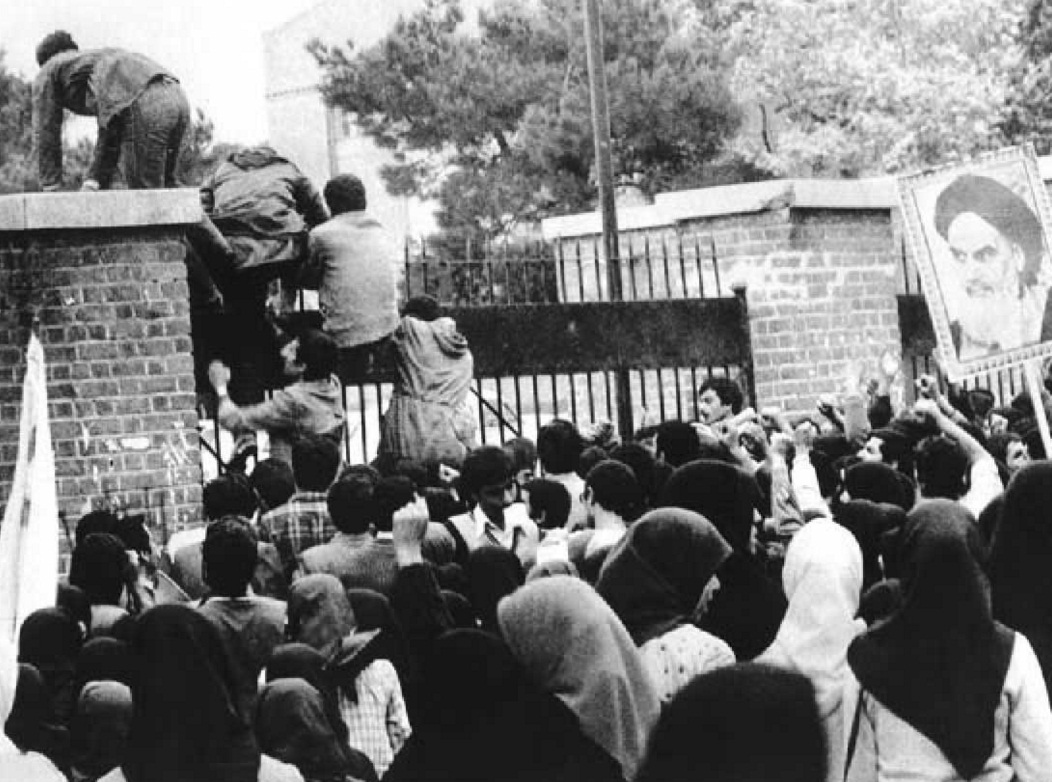
Iranian students entering U.S. embassy in Tehran, Nov. 4, 1979. (Wikimedia Commons)
That “whole new experience” when Iranian students burst into his office does not seem to have ended until Kennedy died at 93 on May 3 in Bar Harbor, that waspy redoubt along the Maine coast.
Upon his return to the States, he acted swiftly once the ticker-tape parades were over and the Klieg lights were off. He resigned from the Foreign Service without hesitation and turned himself into a dedicated, admirably insightful critic of U.S. foreign policy, bringing to bear his years of experience on the inside.
He lectured widely, interviewed often and wrote extensively. As soon as he left the Foreign Service he founded the Cathedral Peace Institute at St. John the Divine on Manhattan’s Upper West Side, the longtime home of many an activist in international affairs. The Times quotes an appearance he made on a public-access television show in 1986, when his book came out:
“When it comes to foreign affairs, the last thing in the world an American is willing to do is to think or to try to think what it would be like to be a Soviet, to be an Arab, to be an Iranian, to be an Indian. And the result is that we think of the world as a projection of ourselves, and we think that others must be thinking along the lines we’re thinking. And when they don’t, we’re troubled by it.”
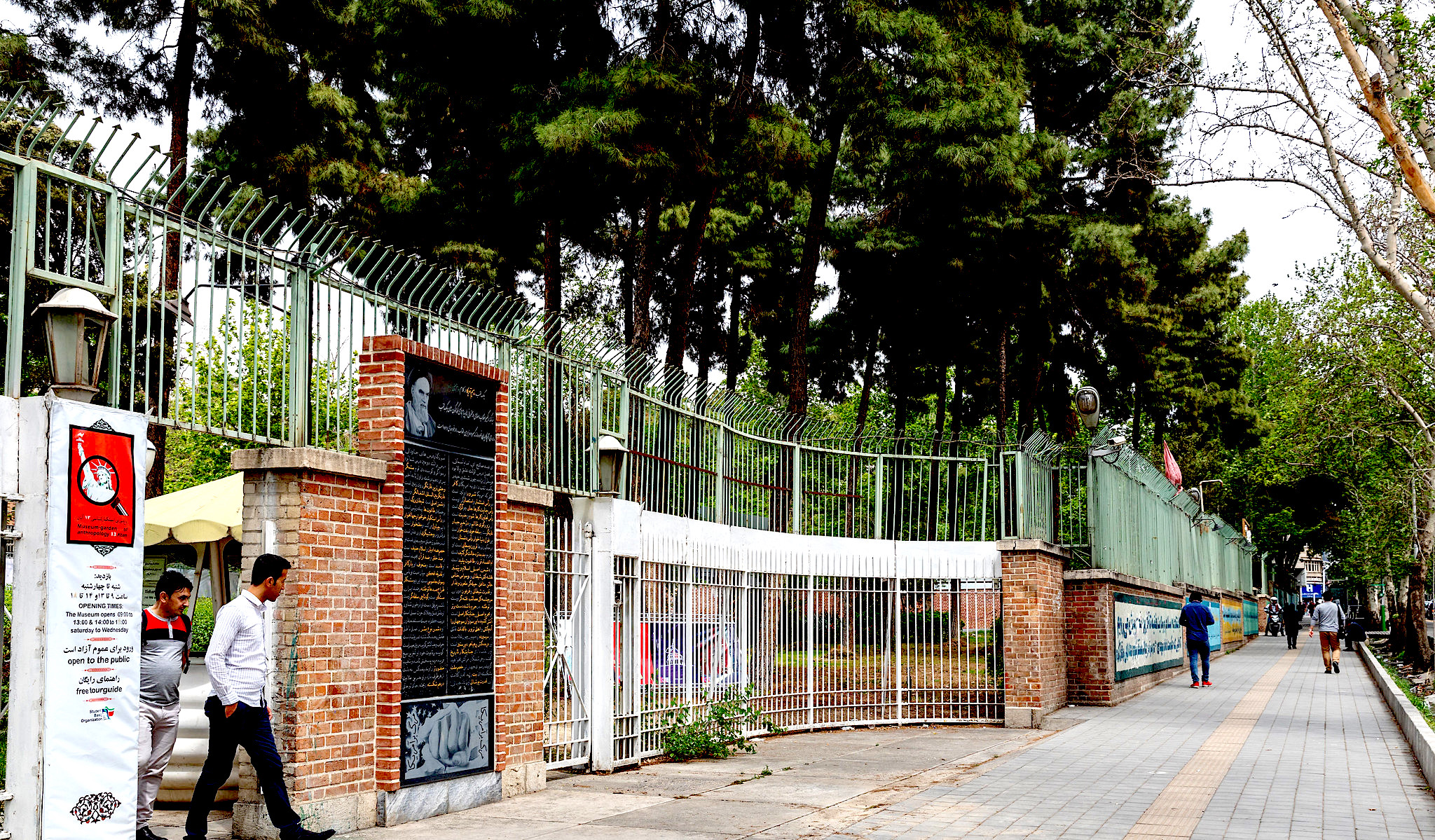
Former U.S. embassy in Tehran, now a museum, in 2018. (Ninara, Flickr, CC BY 2.0)
This is luminous thinking. Kennedy did not limit his concerns to this or that mistaken policy — we got it wrong in Lebanon, in Angola, or wherever the world over.
I value him in part because he took on the psychological deformations that have so much to do with what has made American foreign policy a rolling disaster since the 1945 victories and Washington’s pursuit of “global leadership,” that polite term for aggressive hegemony.
Here he is on what has become a familiar obsession within the policy cliques since his time in captivity began 45 years ago:
“The elements in the Arab world and in Iran are reacting against us through another kind of war — a low-intensity war called terrorism. And I think it is a way of trying to make us understand, or at least be aware, that they have a different point of view.”
When I read this remark my mind went immediately to that intellectual charlatan of the Bush II years, Richard Perle, who argued with supreme and consequential stupidity following the 2001 attacks, “Any attempt to understand terrorism is an attempt to justify it.”
And then I thought of the discourse concerning Hamas: One must call Hamas “terrorist” at all times and without exception and in every mention so as to avoid all understanding, just as Perle insisted.
The line of thinking we call perspectivism — the recognition that none of us has a monopoly on truth, “values” or interpretations of reality — has been around since Nietzsche pondered it in the late 19th century. Moorhead Kennedy is what it looks like in practice, on the ground, reading at a desk while captive.
How impoverished have we made ourselves since Kennedy’s time. How vast a distance lies between his thinking and the ideological non-thinking of Antony Blinken and Jake Sullivan. They are guilty on a daily basis of every sin Kennedy identified.
The day before the Times published its Moorhead Kennedy obituary, Sergei Ryabkov, Russia’s deputy foreign minister, reflected on the state of U.S.–Russian relations in an interview he gave TASS, the Russian news agency, in mid–May.
“They live in a bubble,” he said of the Biden regime’s policy cliques, “and do not perceive outside signals that go against their preconceptions.”
He went on to say of the Atlantic nations as a whole, “We feel not an ounce of trust, which triggers political and even emotional rejection.” Isn’t this a good description, albeit coincidental, of how the Iranian students thought and felt toward the U.S. when they climbed over the wall and burst through the gates in 1979?
Send Blinken and Sullivan to the Den of Espionage, I say. Wouldn’t there be some slim chance the bubble they share would burst? And that maybe they would come home with a perspectivist grasp of the world they might suddenly see and hear, and they would stop running America’s standing in the world straight into the ground?
Patrick Lawrence, a correspondent abroad for many years, chiefly for the International Herald Tribune, is a columnist, essayist, lecturer and author, most recently of Journalists and Their Shadows, available from Clarity Press or via Amazon. Other books include Time No Longer: Americans After the American Century. His Twitter account, @thefloutist, has been permanently censored.
TO MY READERS. Independent publications and those who write for them reach a moment that is difficult and full of promise all at once. On one hand, we assume ever greater responsibilities in the face of mainstream media’s mounting derelictions. On the other, we have found no sustaining revenue model and so must turn directly to our readers for support. I am committed to independent journalism for the duration: I see no other future for American media. But the path grows steeper, and as it does I need your help. This grows urgent now. In recognition of the commitment to independent journalism, please subscribe to The Floutist, or via my Patreon account.
This article is from ScheerPost.
The views expressed are solely those of the author and may or may not reflect those of Consortium News.
Views expressed in this article may or may not reflect those of Consortium News.
Please Donate to the
Spring Fund Drive!



Growing up and experiencing life under the shah’s tyrannical rule, I think this quote nicely sums up the psyche of Iranians in the years leading to the 1979 Revolution:
“Many Iranians, disoriented, forced to think in new and strange ways, to perform unfamiliar tasks in accordance with unfamiliar norms, humiliated by their inadequacies as they tried to behave as Westerners, and disinclined to become proximate Westerners, second-class at best, sought above all for a renewed sense of their own identity.”
What angered Iranians was not only the US backed 1953 coup which brought their democratically elected government down but also the way in which they were treated by the shah and his western backers following the coup.
There was a systematic transformation (some say attack) dictated to Iranians on all aspects of their lives, including politics, economics, society and culture. However, Iranians deeply believed that the shah’s rule was illegitimate and he was basically a US puppet. The presence of 50000 US military advisors in Iran symbolized this attitude.
So no matter what the shah did, he would be dismissed by the overwhelming majority of Iranians as a puppet and a dictator.
Importantly, after the shah’s downfall, Iranians could not forgive the US and Britain for overthrowing their legitimate government in the 1953 coup – not necessarily because of the coup per se. The events that followed the revolution have shown that the US persisted with the undermining of Iran’s sovereignty.
Recently, some western observers have claimed that Iranians have become more pro west than before. That notion might be misleading. No matter how complex the relations between Iranians and their government has been, at critical junctures (e.g. the US asassination of Qasem Soleimani and death of president Raisi) they have shown they would rather stick by their (not so good) government than the foreign powers. Should this mentality give a heads up to the US and its allies that they might be doing something wrong and change their behavior? I doubt it.
“Send Blinken and Sullivan to the Den of Espionage, I say. Wouldn’t there be some slim chance the bubble they share would burst? And that maybe they would come home with a perspectivist grasp of the world they might suddenly see and hear, and they would stop running America’s standing in the world straight into the ground?” PATRICK LAWRENCE
No offense; BUT, IMO, NO! Absophknlutely NOT!!! “Some humans ain’t human,” i.e., Blinken, Sullivan, Dracula, Kirby, KJP, Thomas-Greenfield, the Biden-Harris cabal, et al. Rewiring, reconfiguring, restructuring, rehabilitating will not restore the Biden-Harris cabal’s battery life. “They” are NOT worth saving. “They,” Blinken, Sullivan, Dracula, Yellen, Austin, Raimondo, Buttigieg, Dunn, Granholm, Becerra, Biden-Harris, etc., etc., etc., are expiring. “Let them expire!” In sum, “Pull the Plug!” Do NOT Resuscitate. DO Relocate the Biden-Harris cabal. Take ‘em back to the start, into bowels of the war zone’s headquarters aka the world’s largest U.$. Embassy, in downtown, Baghdad, Iraq.
“Let it be,” the U.$. Embassy, in downtown Baghdad, Iraq, the “bubble they share,” their “forever home!”
“Make It Rain!!!” For example, “the bubble they share” straight-up f/explode, i.e., F/B O O M per the toxic fumes emanating from the burning, plastic, brainage, saturated in artificial intelligence. The drainage, Blinken, Sullivan, Dracula, KJP, Kirby, Dunn, Biden’s-Harris’ WH’s cabal, M.I.C., F.B.I., C.I.A., Congress, et al., stinking up the planet!!!
Imo, it’s a matter of time, Biden-Harris et al., are Done & Dusted!!! “The one who paddles two canoes, sinks.”
HENCE, I, LeoSun, second, Russia’s deputy foreign minister’s emotion,
…. “We feel not an ounce of trust, which triggers political and even emotional rejection.” Sergei Ryabkov
AND, the E-“Motion Carried;” Onward & Upwards. TY, Patrick Lawrence, CN, et al. “Keep It Lit!”
Now we stand at the edge of the abyss with the US giving Ukraine the green light to use US weapons to strike targets deep inside Nuclear Russia. Thousands of Russian speaking citizens murdered by Ukranian Nationalists in the Donbass…..Thousands of Gazans murdered by fascist Israel the Nuland-Kagan Neo Con Zionist gang pushing Zelensky-NATO at the doorstep their PNAC dream averted in Syria by Russia. Ackman Adelson Sandberg and the Zionist Billionaires destroying our educational institutions and supporting fascist G’vir Smotrich Netanyahu Israel. Draw your own conclusions.
Excellent article. I just loved it so much.
I am sure there are always many people who are very well able to see others for who and what they are and to hear what they have to say. However such people are almost never promoted to high positions in the imperium. Or if they are then they are let go.
This ability to see and hear others and what they have to say is a mark of maturity. It is the habit of “seek first to understand, and then be understood”, one of the seven habits listed and described in the late Stephen R. Covey’s book The Seven Habits of Highly Effective People. His book also lists and describes six other habits, and shows throughout the book a process by which one acquires and develops such maturity.
I remember when I was a child and when I was young I was very slow in learning to see or to try to see something from another person’s point of view, or even the need to do so. I had the idea that certain people and countries were “good” and certain other people and countries were “bad”.
Actually a person needs to understand and take seriously one’s own self and one’s own true feelings and needs before one can understand or try to understand others. One must (truly) love oneself before one can love others. According to the late writer and psychotherapist Alice Miller one needs to be able to empathize with the (usually abused or mistreated or humiliated, or traumatized) child that one once was before one can understand and empathize with others. Almost all people have been abused or traumatized in some way or another as children, and have usually repressed such trauma. One needs to become conscious of and fully feel one’s repressed trauma, and empathize with the child that one once was, before one can be able to fully empathize with another person.
I myself had a very difficult father, who was far from being the worst father anybody ever had but who even so was a very difficult person. In particular my dad was extremely judgmental, and while he always said he loved me he was very often especially poor at understanding, or even trying to understand, from my point of view, some sensitive personal issue which was causing me to be upset or unhappy or frustrated. And he would very seldom admit that anything he said or did was wrong. It almost never did much or any good to try to talk something out with him; he was almost always very positive he was right. (He often liked to say, half jokingly, “I may not always be right but I am never wrong”.) After my dad died it took many years for me to deal with and process my feelings of anger toward him. After I came to realize how angry I still was with him a little over a year after he died there was no going back.
When he says for a 2nd time in 26 years may indicate we were once more after a coup to get rid of the shah that was sabotaged by the Iranians. This time they learned to use us. We may have been mad because of their OPEC oil boycott. The kind of thing that increased B-52 fuel costs and supply for the Vietnam war turning our attention into the Carter Doctrine. There also at some point was a lone assassin killing a Saudi King. Then a new collaboration between CIA ans Saudi intelligence for the 80’s.
[north] america’s standing in the world?
close to 1,000 military bases around the globe.
and russia’s deputy foreign minister stating:
“we feel not an ounce of trust …”
TRUSTING OTHER’S might bring peace.
but “peace does not pay!” mistrust sells arms.
and employs them, too.
as to blinken & co’s bubbles eventually bursting:
if you were brought up firmly believing in
american exceptionalism, why would you
want to change anything, as an american who
thoroughly benefits from american exceptionalism?
The Bobbleheads inside the Beltway Bubble would likely dismiss Amb. Kennedy as a sad casualty of the Stockholm Syndrome.
The most important part of this article ,and with much admiration of Mr.Kennedy .So important that we talk to people in other nations, that have a different point of view .That is when we show our humanity .We need so many more people like Mr.Kennedy in this world .
“Mr. Kennedy’s thoughts on U.S. foreign policy,” as the Times’ obit explains, “were partly shaped by discussions with his captors.”
Beautiful and sensitive. It almost makes me want to read the NY Times again. Almost but not quite.
My parents were living and working in Tehran at the time of the hostage-taking, and previously from 1946-51 and 1967-1979. They had the benefit of being trans-national (one American, the other Japanese-Canadian) and were among the many Americans (everyone who was registered at the embassy at the time) who were notified on November 1 to STAY AWAY FROM THE EMBASSY because an action was going to happen that Sunday. Many of the hostages were in CIA cover jobs, including the two women. Why anyone was at the embassy, save the poor military grunts, is still a mystery to me. Did they not believe the Iranians could successfully effect an action? Were they really that stupid or out of touch with reality? What the US did from 1946 (at least) till 1980 was at the very least what I called “cultural rape” (among other forms or rape, I might add) at the time. But it’s really the racism necessary of the colonialist that you’re talking about. It is not difficult to empathize with another human being. Newborn infants do it. It takes training and indoctrination to be unable to do this very simple human act. And that is what our educational system, media, entertainments, government institutions, military (especially the military–in boot camp, first and foremost) shove down American citizens’ (and residents’) throats. We spend billions of dollars every year doing it. This is the edifice on which our nation stands.
The conflict over Palestine within the US media, universities, on our streets, in our government and military is just another version of the same colonialist inability to empathize with a fellow human. The pro-Israeli lobby spends billions every year stateside and overseas to keep that racism in place. Israel would never have been created without it and it cannot survive the opening of the world’s eyes. And what Americans cannot see will kill them. NOT because “terrorists” (ridiculous term–the colonialist is the true terrorist) will kill them. Its own racism is the greatest threat to the U.S. And always will be.
Kennedy was not that unusual. Lots of Americans went to the U.S. blinded and deafened by their own acculturation at “home”. And were rendered–miraculously!–able to see and hear by the simple act of empathizing with an Iranian. It’s really easy to do. Of course, if they were working for the government or CIA they were labeled ruined and send back to the U.S.
Better still, send them all to Guantanamo, for an indeterminate period, so they can fully appreciate american justice.
“Wouldn’t there be some slim chance the bubble they share would burst?”
no, there wouldn’t. these things evolve. such ‘weakness’ is weeded out early now.
Whaaat??….are you seriously trying to say that other people in the world may have a different perspective?? That’s impossible!
“… maybe they would come home with a perspectivist grasp of the world they might suddenly see and hear, and they would stop running America’s standing in the world straight into the ground?”
Hmmm … any good “standing” the US had around the world was due to two things: (1) lack of familiarity of the locals with actual US actions and history and (2) the incredible propaganda narrative output of the USUK system.
Otherwise, to those who knew us well, beginning with native Americans and black Americans and then our neighbors to central and south America and then the Philippines, Vietnamese, and others to whom we have extended our attention over the decades, American standing is well known.
There are true believers in the American way like the late Mr. Kennedy who enter govt service to serve the nation identified according to the propaganda narrative; these folks can indeed have their eyes opened by real contact with the “other.”
There are others, not susceptible to contact conversion, exemplified by people like the Dulles Bros all the way to the current incarnation of Blinken and Sullivan, who understand what the country’s FP is really about as opposed to the propaganda: setting up the conditions to enable the people who matter to loot domestic and foreign national wealth to private gain.
I wonder which of these types does the most harm in the long run …?
“Innocence is like a dumb leper who has lost his bell, wandering the world, meaning no harm.”
? Graham Greene, The Quiet American
“In any event this has had very unfortunate consequences, the most serious of which is to encourage ordinary citizens to fly in such a dangerous machine”
-R. P. Feynman
Volume 2: Appendix F – Personal Observations on Reliability of Shuttle
Loved Professor Feynman. Read how he came to the conclusions he wrote about in Appendix F on the Challenger disaster. First thing he did was go out and talk to the guys turning wrenches.
He found the truth, and they fixed the problem.
The head of the Commission thought he was a “pain in the ass”.
If the emperor has no clothes (The Diplomat has no Diplomacy) somebody he listens too really should tell him. At the risk of being “a pain in the ass”.
Let us ordinary citizens off this dangerous machine.
Sounds good to me! Do it to all our would-be ambassadors!
The only ‘diplomacy’ America knows is to be found at the end of a gun barrel.
“Send Blinken and Sullivan to the Den of Espionage, I say.” Why stop there? Send Biden along with them just to get him to a location where he can’t screw up the U.S. and the rest of the world. Great article otherwise.
It will take some time, perhaps a decade, before the Washington D.C. establishment acknowledges the ineptness, the arrogance, and the cruelty of Blinken and Sullivan. The hand writing is on the wall. US and Western hegemony has peaked and in a messy, chaotic decline. But instead of managing the decline, those two remain convinced that they personally have the smarts to maintain hegemony. They have both been to China, but Blinken especially doesn’t seem to understand that China has 1.4 billion people, is filled with Engineers who have transformed the country from backwater to modern in under 40 years. Yet these two are convinced that with military muscle and illegal sanctions D.C. can convince China to become a vassal state similar to the current hapless German government. And their misreading of Russia and Putin is incomprehensible. Who knows who Trump would appoint to fill those two vacancies. His track record is not good.
Amen!
J. Michael Springmann, Former US Diplomat: “[FSO Jospeh P.] O’Neill had been Deputy Chief of Mission when the blind Sheik Omar Abdul Rahman got his visa to come to the United States through one of the CIA officials working undercover in the consular section [in Khartoum, Sudan].
[…]
He had also been assigned to Teheran, when the Iranian students took over the embassy the first time, and while he was there, according to the interview with Georgetown [University], he worked to help the Israeli embassy evacuate their staff, but he opposed evacuating the American embassy and in fact fought with the Political Section, who wanted to contact Washington and say, we really need to evacuate the embassy, or we are going to have some real political problems with Iran [for further context, see p. 31-34 of Thomas Dunnigan’s oral history interview with Joseph P. O’Neill for the Association for Diplomatic Studies and Training (ADST)].”
Source:
Lars Schall, “Is the Whole War on Terror a Fraud?” (Interview with J. Michael Springmann, Author of “Visas for Al-Qaeda”), Foreign Policy Journal, April 15, 2015